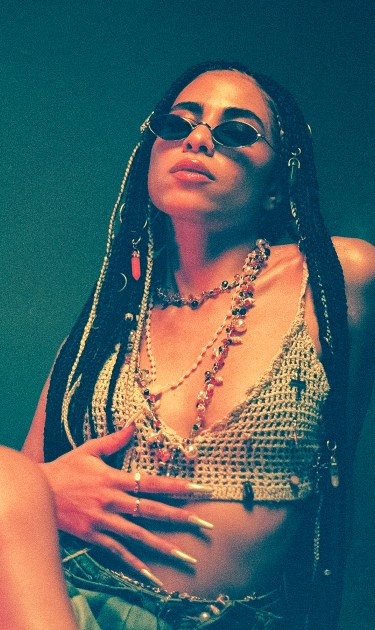Vera Delacruz can remember the exact moment she realized she wanted to become an artist. Growing up in the city of El Tigre in Venezuela, she recalls being an extroverted child who loved to improvise dances for her family and was hooked on MTV. Back then, pop music was her obsession, particularly Shakira and Britney Spears, even at the precocious age of four. And then, one day at school, an opportunity presented itself. “My teacher asked who wanted to do a Shakira [performance], and I immediately raised my hand,” she shares. After that experience, her mind was made up.
Today, nearly 20 years later, Delacruz is releasing her debut EP, Alove Vera. The six-track album hews more towards alt-R&B and neo soul, which she attributes to her discovery of Amy Winehouse as an adolescent. Pop might have been her gateway to music, but Winehouse’s range and pathos showed her “this is the kind of music I want to do.”
Delacruz, whose real name is Nickole García, is part of a ragtag collective of Venezuelan artists who are mostly associated with local record label LACOSTA and the popular YouTube channel Comida Para Llevar, which features a revolving roster of rappers and singers producing exclusive “sessions” of lo-fi hip-hop, R&B, and more. Last summer, she appeared on one of these releases, resulting in her name suddenly popping up on more listener’s radars. But before that, she had to go through a journey of self-discovery.
After moving back in with her family in the midst of the coronavirus pandemic, Delacruz began to upload covers she’d record herself of Winehouse and Jorja Smith songs. Eventually, they caught the attention of the team at LACOSTA. One thing led to another, and she began being mentored by one of the label’s most prominent names, the rapper Veztalone. Alongside crooner Irepelusa and lyricist Frank Lucas, he forms the group Motherflowers, who have arguably become the centerpiece of the burgeoning Venezuelan alt-R&B and rap scene. Under the tutelage of Veztalone, Delacruz found herself as close as ever to those childhood dreams.

In Veztalone’s opinion, it was an easy call to bring her into their fold, saying that they were impressed with “the texture of her voice,” telling Remezcla: “She has an X factor there; there’s a groove to it that doesn’t feel forced either.”
Delacruz’s first official release after being recruited was “Sunday,” a groovy Spanglish bop shared with rappers Tayko and Frank Lucas. She began recording an EP during this time, but put the brakes on the process when she couldn’t shake a strong gut feeling. “I wasn’t ready, and I think that things happen when you’re ready for them,” she shares.
At some point in high school, she lost the extroverted side of her personality and found herself becoming more withdrawn and shy. Years later, finding herself in a position she’d yearned for, she was stuck and unsure how to get back on track. “It was a moment I felt very lost, and I didn’t have a sense of what I was doing with my projects,” she says.

Veztalone backs up her memory, adding, “In the beginning, it was harder for us to make music together because she was still finding her path, and the work I put in revolved mostly around that. I’d tell her, ‘Let’s try this, let’s experiment, let’s try different types of songs and discover where you’re most comfortable, what you want to say, how you want to say it.’ When it comes to that, she’s grown so much,” he says.
It was a process that also included getting over an almost paralyzing stage fright. A far cry from the young girl who would eagerly perform in front of friends, family, and classmates, now she battled nerves in front of a crowd. “I’d panic so much that afterward, I didn’t even remember anything from when I was onstage,” she says. She’d joke that she would try to be an artist who only recorded and never toured, yet she asked herself constantly: “When is this going to go away, and will I be able to get over it?”
The work she put in came to a head when Comida Para Llevar dropped their video for “Caminaaando / Warapita,” a combo of tracks that prominently featured Delacruz in the latter half. The song became a hit, and her contribution was a standout. She quickly returned to work on her EP in earnest, feeling that the “right time” she was searching for had finally arrived.
“One of the most incredible things about [making a project] like this is how everybody discovers a lot about themselves as an artist because of the new obstacles that you encounter.”
“One of the most incredible things about [making a project] like this is how everybody discovers a lot about themselves as an artist because of the new obstacles that you encounter,” she shares. An example is how she utilized her downcast feelings as unconventional muses, such as in standout tracks “AGRADECER” and “MESTIRO.” She explains the inspiration for “MESTIRO,” saying: “It’s super upbeat and doesn’t sound like a sad track, but the lyrics are about depression and how you can’t even get up from bed. You think, ‘Oh, I have to do something at so-and-so time.’ And instead, you stretch the time and tell yourself, ‘I’ll wait one more hour,’ because you don’t have enthusiasm for anything.”

Instead of succumbing to that feeling, she channeled it with a boost from her colleague. “Veztalone called me and said, ‘Hey, let’s do a session today. How’re you feeling?’ And I told him, ‘I feel down, I don’t have energy to get up. Everything feels like a chore.’ And he said, ‘Okay so let’s make a song about that.’ And we did!” she says. The experience crystallized the benefits of the creative process on her wellbeing. “It wasn’t planned ahead. It was something that just happened based on my emotions that day and how I found the drive to see it through.”
For his part, Veztalone concurs. “I’ve witnessed not just her musical growth but also her impetus and her decision-making and becoming sure of what she wants,” he says. “Once we started working on this album, her growth was exponential.”
“That’s partly why the EP is called Alove Vera,” Delacruz says. “It’s a play on ‘aloe vera,’ which is a healing topic.” Now that she’s found her footing and has a grasp on her artistic identity, she’s ready to dive in fully to the opportunities that await. “This album was like my therapy that helped me heal and helped me regain my motivation and love for this process,” she says. “From there, everything evolved.”
Listen to Alove Vera below.





